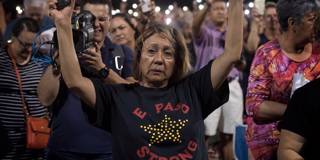Donald Trump has racialized American politics more than any US president in living memory, and many are blaming him for acts of racist violence, like the recent mass shooting in El Paso. But, given that what makes politics in the United States so complicated is the conflation of race, class, and culture, his opponents should not follow his example.
LONDON – The recent mass shooting in El Paso, Texas, carried out by a young white man who had posted a hate-filled anti-immigrant screed shortly beforehand, has called attention to US President Donald Trump’s own rhetorical affinity for white supremacy. Trump has consistently insulted Mexicans, African Americans, and other people of color. He referred to Haitian and African immigrants as coming from “shithole countries.” Last month, he told four new members of Congress, Alexandria Ocasio-Cortez, Rashida Tlaib, Ayanna Pressley, and Ilhan Omar, to “go back” to where they came from. All four Congresswomen are, of course, American citizens. All but one (Omar) were born in the United States.
Trump’s Republican supporters deny that he is a racist. Who knows? But he is clearly appealing to his followers’ darkest instincts, which are angry, vengeful, bigoted, and prejudiced in ways that can only be described as racist. By stirring up hatred, Trump hopes to mobilize enough voters to be reelected next year.
The president is careful not to incite people openly to commit violence. But many violent people feel licensed by his words to do so. This makes Trump’s behavior dangerous and contemptible, and he must be held to account for it. He deserves to be called a racist. Some of his critics go further than that. They argue that race should be the central issue of the 2020 elections. Because Trump relies on angry white voters, diversity, anti-racism, and the elevation of people of color should be the counterstrategy.

LONDON – The recent mass shooting in El Paso, Texas, carried out by a young white man who had posted a hate-filled anti-immigrant screed shortly beforehand, has called attention to US President Donald Trump’s own rhetorical affinity for white supremacy. Trump has consistently insulted Mexicans, African Americans, and other people of color. He referred to Haitian and African immigrants as coming from “shithole countries.” Last month, he told four new members of Congress, Alexandria Ocasio-Cortez, Rashida Tlaib, Ayanna Pressley, and Ilhan Omar, to “go back” to where they came from. All four Congresswomen are, of course, American citizens. All but one (Omar) were born in the United States.
Trump’s Republican supporters deny that he is a racist. Who knows? But he is clearly appealing to his followers’ darkest instincts, which are angry, vengeful, bigoted, and prejudiced in ways that can only be described as racist. By stirring up hatred, Trump hopes to mobilize enough voters to be reelected next year.
The president is careful not to incite people openly to commit violence. But many violent people feel licensed by his words to do so. This makes Trump’s behavior dangerous and contemptible, and he must be held to account for it. He deserves to be called a racist. Some of his critics go further than that. They argue that race should be the central issue of the 2020 elections. Because Trump relies on angry white voters, diversity, anti-racism, and the elevation of people of color should be the counterstrategy.